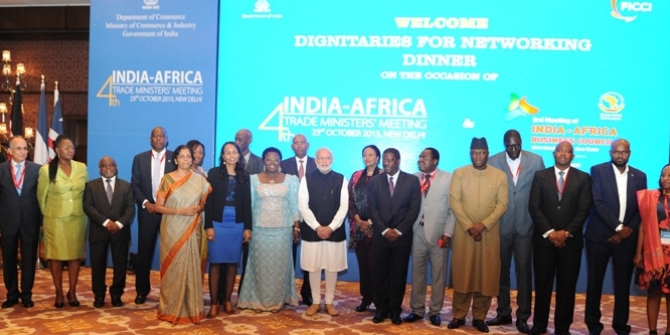As ethnic tensions rise in Guinea, LSE alumnus, Olivier Bucyana calls on the country’s neighbours and regional organisations to ensure the channels of communication between the ruling and opposition coalitions remain open. This post originally appeared on the website of the Open Society Initiative for West Africa (OSIWA).
Blessed, or some would argue, cursed, with its natural resources, Guinea has the largest reserves of iron ore in the world, including 30% of the world’s known reserves of bauxite and other metals, like gold and diamonds, just to name a few. Also known as the “water tower of West Africa”, the potential for hydroelectric power is immense, yet in the countryside electricity is rare and in Conakry, power cuts are part of every day life. This paradox seems to reflect the current political crisis the country is facing.
Among the many explanations one can come up with to explain the current state of affairs in Guinea, one seems to stand out more: the ethno-political landscape of the country. Today, Guineans like to describe their country as divided in four “natural” regions, each associated with a specific “ethnic” group: The predominantly Soussou “Basse Guinée”, the Peulh in “Moyenne Guinée”, the Malinké in “Haute Guinée” and the Forestier in “Guinée Forestière”. That of course, in itself, isn’t a problem, and this association of regions to specific groups isn’t clear-cut since all four groups cohabit and intermarry. Nonetheless, common knowledge among Guineans is that the Peulh and Malinké are the largest groups, with the former, represented by Cellou Dalein Diallo on the political scene, and the latter represented by current president, Alpha Condé. Today, politics in Guinea tends to reflect these geographical and “ethnic” divisions described above, not only among simple citizens, but also among political actors, political parties, and also within governmental institutions.
After five decades of strong-men politics, Guineans held in 2010 their first real competitive presidential election, which the current President, Alpha Condé, won with 52.52% of the votes in the second round. After this election, legislative elections should have been held within six months. However, despite being rescheduled multiple times, these elections still have not taken place. Originally planned for 12 May of this year, the coalition of opposition parties, chiefly led by Cellou Dalein Diallo, who came second during the last Presidential election, has run out of patience, leading to the political stalemate we see today. The disagreement between the ruling and the opposition coalitions is first on the equipment, provided by South African company Waymark, to be used during the voter registration process, and secondly on the right of the Guinean Diaspora to vote in these legislative elections.
To resolve this issue, President Alpha Condé instructed Prime Minister Mohammed Said Fofana to lead a dialogue between the coalition in power and that of the opposition parties. Both parties agreed to designate three mediators: one chosen by the coalition in power, one by the coalition of opposition parties and the other by a regional/international organisation. A disagreement emerged during these designations when the government unilaterally chose General Lamine Cissé, former Special Representative of the UN Secretary General in the Central African Republic, instead of him being directly chosen by a regional or international body. To settle this disagreement, the government asked the United Nations to designate an international mediator, which they did by appointing Mr. Said Djinnit, the current Head of the United Nations Office for West Africa (UNOWA). Another disagreement occurred when the government chose two mediators, Dr Koureissy Condé and Aboubacar Somparé, instead of one as previously agreed by the opposition and the government. The government went back on its decision and retained Aboubacar Somparé as the only mediator.
Then came the presidential decree setting the legislative elections on 30 June, a decision the opposition describes as unilateral. As a result of this decision, the opposition protested in the streets of Conakry on 25 April, which led to the death of a teenager, who according to accounts was shot by the police.
This political crisis is heightening tension among the various communities, making ethnic conflict highly likely. Earlier this month, protests led to confrontations between the Malinké, generally supportive of President Condé and the Peulh, who tend to back the opposition. This protest resulted in shops being looted and in the deaths of 9 with 150 others wounded. Although, unlike many of their neighbours, Guineans have so far been able to avoid civil war, this last presidential election and the challenges faced in the organisation of these upcoming legislative elections, are revealing deep societal divisions that may continue to shape Guinean politics in the next few years.
Putting the interests of the population above all is important to resolve the current political crisis. For instance, a dialogue between community leaders and religious leaders could help attenuate tensions between the various communities in Guinea. In addition, the Independent National Electoral Commission (CENI) should reassure the opposition by calling on a team of international experts to verify all the equipment, provided by Waymark, which will be used in the voter registration process. Also, to avoid all physical confrontations, opposition parties should avoid resorting to street protests, which tend to heighten the risk of confrontation between communities, therefore jeopardising the gains the country has made in recent years. Although today all efforts may be directed at Mali, neighbouring countries and regional organisations, like ECOWAS, also have a role to play in facilitating dialogue between all parties. The recent mediation efforts of President Macky Sall of Senegal are the kind that could help Guinea in these difficult and uncertain times.
Olivier Bucyana is OSIWA’s Program Associate in Guinea-Conakry.






4 Comments